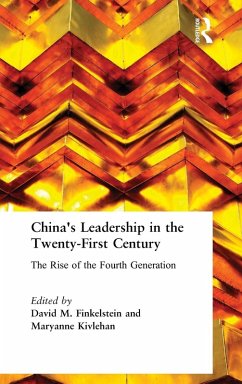
China's Leadership in the Twenty-First Century
The Rise of the Fourth Generation
Versandkostenfrei!
Versandfertig in 1-2 Wochen
29,99 €
inkl. MwSt.
Weitere Ausgaben:

PAYBACK Punkte
15 °P sammeln!
Between Fall 2002 and Spring 2003, most of the national leadership of China's party, state, and military organs will be replaced by a new generation of officials. The accession to power of this "Fourth Generation" leadership, and the "Fifth Generation" officials who will rise to positions of influence on their coattails, will have profound implications for China, for nations in the region, and potentially for the national interests of the United States. This timely work introduces the new leaders of China and describes the political backdrop for their succession. A distinguished international ...
Between Fall 2002 and Spring 2003, most of the national leadership of China's party, state, and military organs will be replaced by a new generation of officials. The accession to power of this "Fourth Generation" leadership, and the "Fifth Generation" officials who will rise to positions of influence on their coattails, will have profound implications for China, for nations in the region, and potentially for the national interests of the United States. This timely work introduces the new leaders of China and describes the political backdrop for their succession. A distinguished international group of scholars look at the process of leadership transition; the prospects and challenges facing the new leaders; questions of legitimacy and influence; flow of information on the transition within China; and security policies in the provinces and the Asia-Pacific region. They provide important insights on the leadership at "the center," in the provinces, and in the military.














